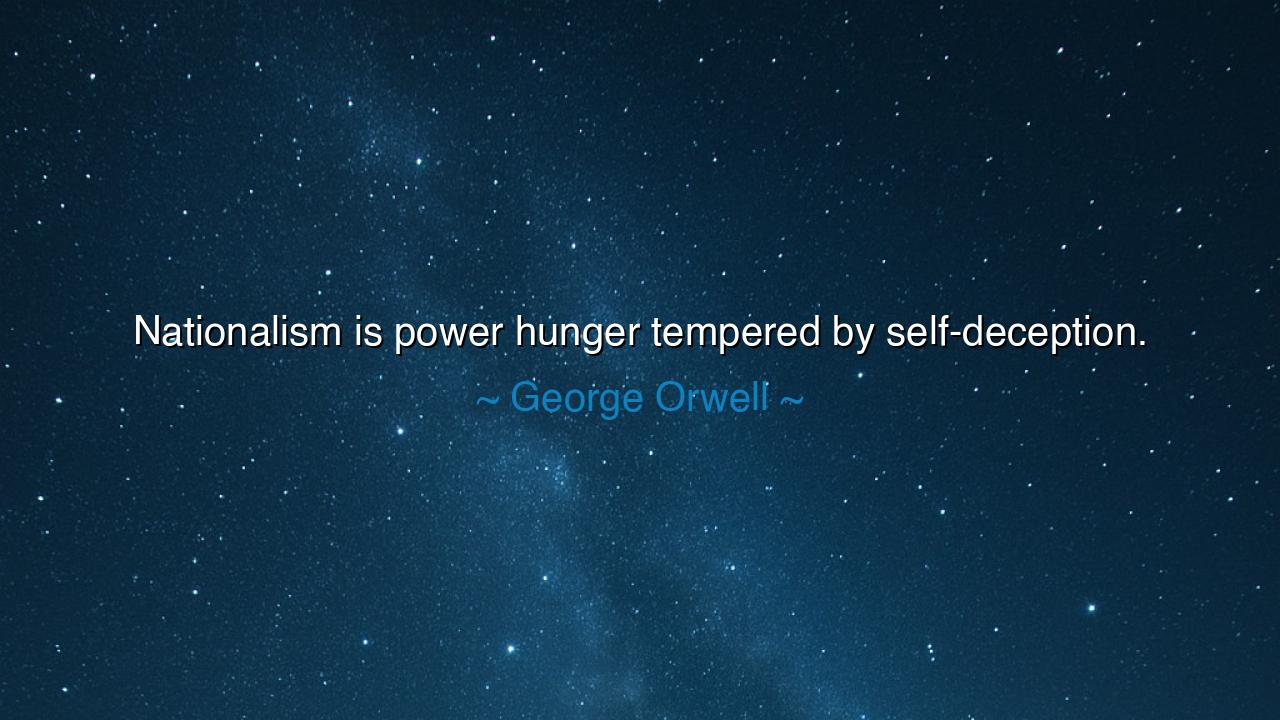
Nationalism is power hunger tempered by self-deception.






George Orwell, the prophet of clear sight, once declared: “Nationalism is power hunger tempered by self-deception.” In this saying lies a warning carved deep into the chronicles of mankind. For nationalism, while often cloaked in noble garb, is but the thirst for dominion, a craving for power that disguises itself as love of country. The self convinces itself it serves a higher good, when in truth it serves only its own desire to dominate, to elevate one tribe above all others.
The ancients knew this peril well. Self-deception is the sweetest poison, for it blinds the heart while flattering the mind. The man who seeks conquest under the banner of nationalism does not confess he lusts for control; instead he says, “I fight for honor, I fight for freedom, I fight for the soul of my people.” Thus tyranny is baptized as virtue, and oppression is mistaken for destiny. Orwell, who witnessed the storms of the twentieth century, spoke not from abstraction but from the battlefield of history itself.
Consider the rise of Nazi Germany, where the fever of nationalism consumed millions. The people were taught that their struggle was righteous, that they were reclaiming greatness denied to them. In truth, it was the power hunger of a few, masked by the self-deception of many, that led to war, ruin, and the slaughter of innocents. What began as pride in nationhood became a dark engine of conquest, proving Orwell’s words with terrible force.
And yet, one must not confuse patriotism with nationalism. Patriotism is love; nationalism is possession. The patriot serves his people with humility, while the nationalist seeks to rule others with arrogance. Patriotism is rooted in truth, nationalism in illusion. Orwell, ever the surgeon of words, sought to draw this line clearly, lest future generations mistake the one for the other.
Let the wise remember: the call of nationalism is seductive, for it whispers of belonging, of glory, of unity. But beneath its song lies a chain, binding men to delusion and feeding the fire of endless strife. To resist it is to resist both the hunger for power and the blindness of self-deception. This is the teaching of Orwell—stern, sorrowful, yet full of light for those who would see clearly.






Vvanh
I find this perspective both brilliant and depressing. If Orwell is right, then the ideal of a benevolent, inclusive nationalism is an illusion. Does this mean efforts to reclaim nationalism for good—like civic nationalism or cultural pride—are doomed to fail? Or can awareness of this self-deception actually make us more honest and ethical about how we express collective identity?
THNguyen Thi Thannh Hao
Reading this makes me uneasy because it suggests that nationalism isn’t just a political problem but a psychological one. If self-deception fuels the hunger for dominance, how can societies ever escape that loop? Maybe the real question is whether humans can separate identity from power at all. Is it possible to feel proud of one’s country without falling into the trap Orwell describes?
GDGold D.dragon
What a harsh but perhaps honest take. I keep thinking about how Orwell frames self-deception not as a flaw but as a necessary ingredient of nationalism. Does that mean people must delude themselves to sustain national pride? It feels almost tragic—like he’s saying we can’t unite under a flag without lying to ourselves about what it costs others. Is unity always built on selective truth?
TTrung
I'm struck by Orwell's cynicism here—was he suggesting that even leaders who believe they’re acting for the greater good are lying to themselves? It makes me think about how easily patriotism can slide into something darker. Can a nation love itself without believing lies about its own superiority? Or is self-deception the only way people can justify putting national interest above universal ethics?
HYTruong Hai Yen
This statement makes me question whether nationalism can ever be truly virtuous. If it's driven by a desire for control disguised as moral righteousness, are nations inevitably doomed to repeat cycles of domination and denial? Could there be a form of collective pride that uplifts without oppressing, or does the very concept of nationalism inherently corrupt human motives over time?